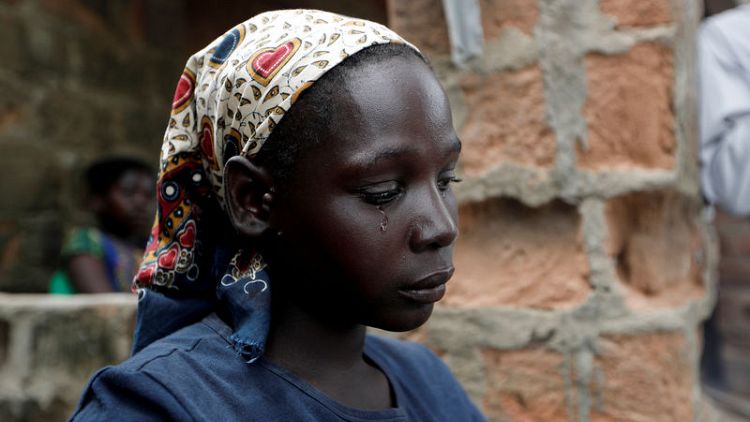By Stephen Eisenhammer and Zohra Bensemra
CHEIA, Mozambique (Reuters) - Maria Jofresse cannot find her two young daughters' graves, though she helped dig them herself.
A single teardrop swells beneath each of her dark eyes as she recalls the moment the girls were snatched away by the fast-flowing floodwaters.
It took four days to find their bodies, which were buried where Cyclone Idai had left them, far from where they lived.
"I cannot recognise it anymore," the 25-year-old mother said, drying her eyes with a patch of patterned skirt at a makeshift camp of blue tarpaulin, near the riverside village of Cheia. "I cannot find them."
On the night of the storm, Jofresse took shelter at her mother-in-law's house with her husband and children, a 6-month-old baby and 4-year-old girl.
The next day, the river beside the village broke its banks and water rushed in. The family fled, trying to reach the main road, which lies on higher ground.
But the water was too quick. Afraid they'd drown, the family climbed into a single cashew tree.
For 11 hours they clung to its branches, Jofresse cradling the baby while her husband held their eldest girl.
At 10 pm, in total darkness, the flood ripped the tree's roots from the soaked earth, throwing the family into the fast-flowing water and separating them.
Jofresse survived by grabbing onto another tree. The next day, wading through the now largely stagnant water, she found her husband. Together they searched for the girls.
On the morning of the fourth day, they found the body of their eldest, and in the afternoon, their lifeless baby.
The children were among more than 800 people killed in the storm and the heavy rains before it struck Mozambique and two other southern African countries, Zimbabwe and Malawi.
After digging two small graves, the couple joined other families at the camp set up just a few kilometres (miles) from their destroyed home.
"We will stay here, because there's nothing to go back to," Jofresse said, sitting in a small square of shade at the camp.
"You can come and live with me," her father, Joao Jofresse Ngira, interjected, distraught at his daughter's pain.
Jofresse does not answer.
It is not the first time she has lost a home. In 2000, when she was just 5, devastating floods destroyed her nearby village of Mashongo.
The government moved the family to a new community, built for those with nowhere to go after that disaster.
Ngira showed Reuters around the village, located by the River Muda. It became known as Cheia, or "Flood" in Portuguese - "because we were brought here from the water," he explained.
The spot was chosen because it was on higher ground and less prone to flooding.
"It was meant to be safe," he said, standing outside the ruins of the four-room house the government helped him build. Five young children played in the pile of broken bricks and cracked cement.
Cheia's fate shows how climate change is threatening places that just under two decades ago were considered safe.
United Nations Secretary-General Antonio Guterres said the catastrophe in Mozambique rings "yet another alarm bell" about the dangers of global warming, which scientists say will make devastating storms like Cyclone Idai more frequent.
"Since this disaster, we haven't seen anyone from the government, even though they're the ones that put us here," Ngira said.
Asked if he would like to move somewhere else, he looks down at his muddy yellow trainers, before replying: "I don’t have any money. It's best not to dream."
On the Sunday Reuters visited, the camp bustled with rumours that food would be delivered that afternoon.
It had been a week since the last bit of aid arrived and people were hungry. Jofresse cancelled a memorial service for her daughters because she feared the food might arrive while she was gone.
When the aid finally comes, Jofresse unpacks the parcel in her blue tent. There is a set of nappies.
She puts them to one side.
Click on https://reut.rs/2UHekC4 for a related photo essay.
(Writing by Stephen Eisenhammer; Editing by Alexandra Zavis and Alexandra Hudson)
